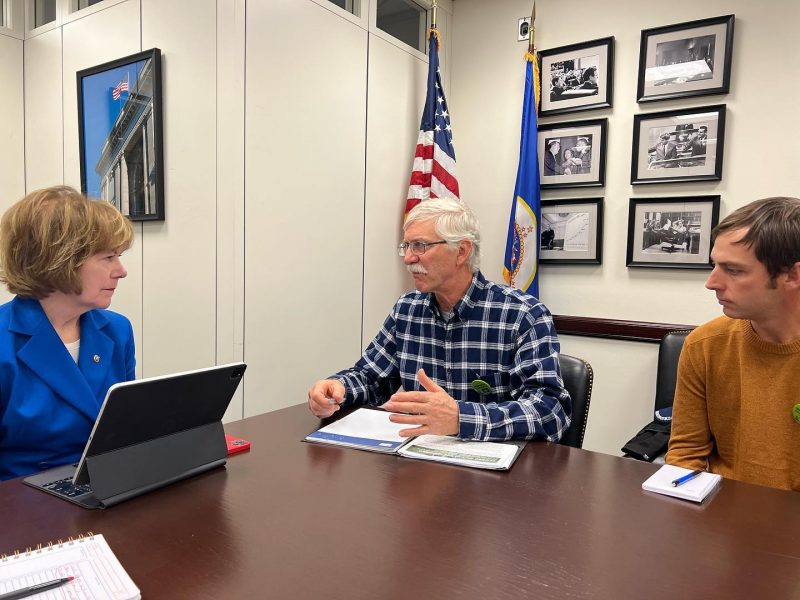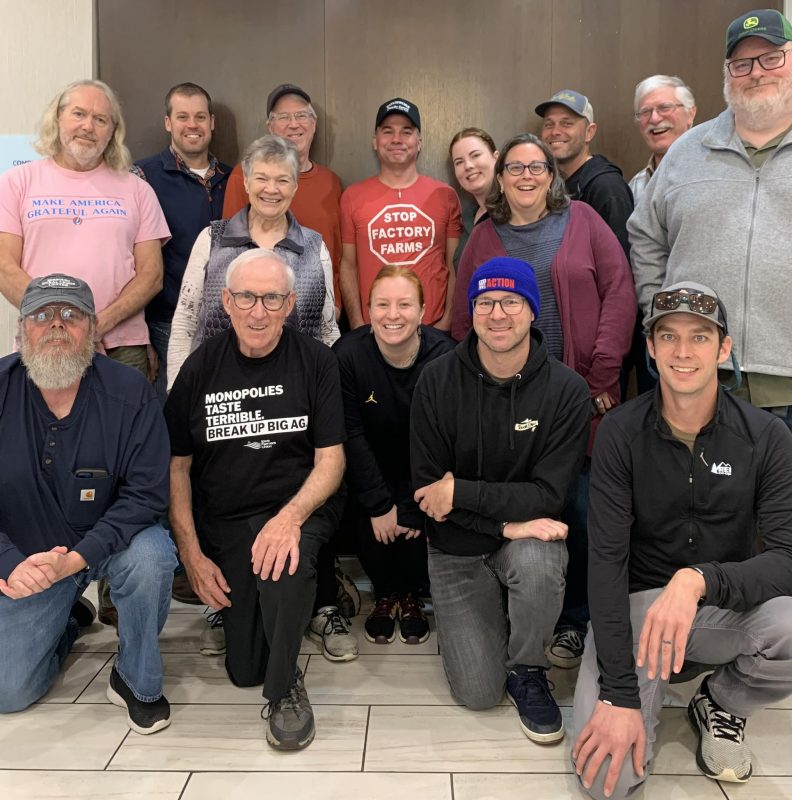Earlier this month, Land Stewardship Project farmer-members James Kanne and Adam Griebie flew to Washington, D.C., with me for a few days to gather with farmers and organizers from across the Midwest who are a part of the Campaign for Family Farms and the Environment and to meet with members of Congress about our shared priorities for a more competitive farm and food system.
LSP’s meetings focused on the Minnesota Congressional delegation. We met with Sen. Tina Smith, staff from Sen. Amy Klobuchar’s office, staff from Rep. Angie Craig’s office, and staff from Rep. Betty McCollum’s office. We had productive conversations about a variety of topics, including mandatory Country of Origin Labeling (COOL), limiting public subsidies to large-scale feedlots, and the Whole Farm Revenue Protection Improvement Act. James, a semi-retired dairy farmer from Renville County, shared powerful stories about the consolidation of the dairy industry and Adam, a corn and soybean farmer from McLeod County, shared about how challenging it is for many farmers to access conservation programs.

One of our top priorities during this trip was the EQIP Improvement Act. The Environmental Quality Incentives Program (EQIP) is an essential initiative that gives thousands of farmers the tools they need to implement sustainable practices such as cover cropping and managed rotational grazing. Yet, a majority of farmers are unable to access EQIP funding. In 2022, only 26% of EQIP applicants in Minnesota were awarded contracts, which tracks the national average. Additionally, we spend hundreds of millions of dollars in EQIP funds on infrastructure practices that often support practices on concentrated animal feeding operations (CAFOs) and mega-cropping operations that provide little environmental benefit.
The EQIP Improvement Act, a bipartisan bill introduced by Senators Cory Booker (D-NJ) and Mike Lee (R-UT), would redirect support towards farmers and ranchers that need it the most by targeting funding to more producers and prioritizing conservation practices with significantly greater environmental and water quality benefits. The bill:
- Reduces the maximum EQIP grant from $450,000 to $150,000. EQIP can reach more farmers without increasing funding by providing smaller grants to many more farmers, rather than large grants to a smaller number of producers.
- Eliminates the requirement that 50% of EQIP funding flow to livestock operations. Many of these dollars are spent on CAFOs. Some of these CAFO-focused practices, such as waste facility covers and waste storage facilities, are among the most expensive EQIP practices.
The EQIP Improvement Act will reshape EQIP to be more equitable and effective. Could you take just two minutes to ask your U.S. Representative and U.S. Senators to co-sponsor the EQIP Improvement Act?
Take Action on the EQIP Improvement Act Here
The offices of Klobuchar, Smith, and Craig all committed to looking at the bill and are considering signing on. It is a timely moment to contact them in support of this legislation!
We also hand-delivered a letter from over 125 Minnesota farmers to Sen. Smith, a staff member in Rep. Craig’s office, and a staff member in Sen. Klobuchar’s office about the Whole Farm Revenue Protection Improvement Act, which would help the Whole Farm Revenue Protection Program reach its potential by ensuring that farmers historically left out of crop insurance programs have an adequate safety net. Our letter thanked Sen. Smith for being an active co-sponsor of the Whole Farm Revenue Protection Improvement Act and asked Sen. Klobuchar to sign on. Klobuchar’s staffer committed to looking at the bill and their office is considering signing on.
By the way, while we were in D.C., Congress voted to extend the 2018 Farm Bill through September 30, 2024. Although this means the next Farm Bill has yet to be drafted, this means we have more time to influence its content. Our advocacy is still timely and matters.
LSP policy manager Amanda Koehler can be reached at akoehler@landstewardshipproject.org. LSP’s Farm Bill Platform is available here.
